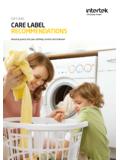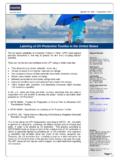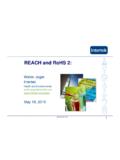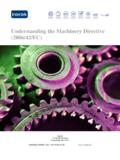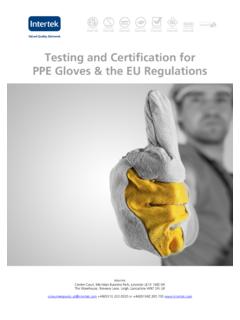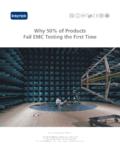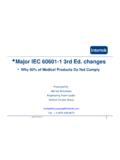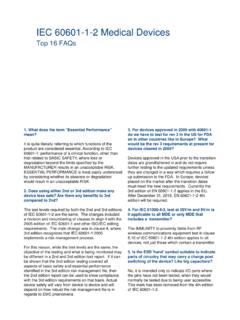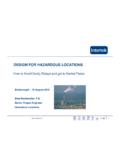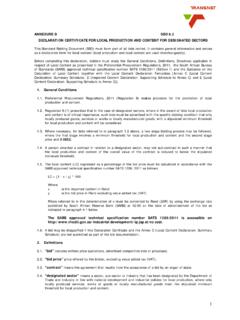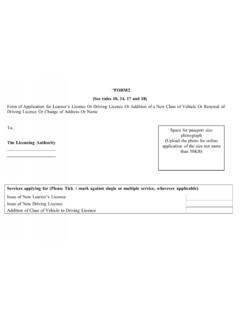Transcription of Public Authority for Industry Kuwait Conformity Assurance ...
1 Public Authority for Industry Kuwait Conformity Assurance Scheme (KUCAS) Guidelines 13 July 2008 QW-750-21 Exporter/Importer Copy 1 Introduction The Public Authority for Industry of the State of Kuwait (PAI) has implemented the Kuwait Conformity Assurance Scheme (KUCAS) as of 17 June, 2006. The scheme is a set of procedures carried out by PAI to verify the Conformity of all Regulated Products to Kuwait s Technical Regulations applicable to imported and domestic products alike in accordance with the regulations of this scheme. 1. REGULATED PRODUCTS All the products listed in Appendix A are subject to the technical requirements and Kuwaiti Standards that have been adopted as mandatory Technical Regulations for the protection and safety of the Kuwaiti consumer and prevention of deceptive practices, in accordance with the Standards Unification Law which grants PAI the Authority for preparation, adoption and application of standards for all products on the Kuwaiti market.
2 These Regulated Products have been classified into (2) classes: Process Manufactured Products: These products are characterized by susceptibility to change in their final nature as a result of probable changes in the nature of the raw materials used and the manufacturing process controls, whereby production is organized in batches. As such, these products are classified as high-risk products requiring frequent verification of Conformity . Non-Process Manufactured Products: These products are characterized by low probability of change in the nature of the final product in comparison with a typical sample of that product, thereby allowing for low frequency of testing for verification of Conformity . A. IMPORTED PRODUCTS All consignments of imported Regulated Products are subject to Conformity Assurance procedures via one of the following (2) routes: 1) Procedures at the Exporting Country: Manufacturer or exporter completes Conformity procedures at the Exporting Country through one of the Certification/Inspection Bodies that have been approved by PAI in accordance with PAI s predetermined criteria ( Approved CIB ).
3 2) Local Procedures: Importer completes Conformity procedures upon arrival of consignments of Regulated Products at Kuwaiti Ports through KUCAS Conformity Unit under the Standards & Metrology Department at PAI. 2. TEST REPORTS & TECHNICAL EVALUATION All exporters or importers of Regulated Products must submit evidence that their products have been successfully tested in accordance with the technical requirements of the sanctioned Kuwaiti mandatory standards and technical regulations by exercising one of the following (2) options: a) At the Exporting Country: Manufacturer or exporter submits a Self Declaration specifying the standards/requirements that his product(s) conforms to, supported by Test Reports evidencing that a complete test was performed on the product in accordance with the Public Authority for Industry Kuwait Conformity Assurance Scheme (KUCAS) Guidelines 13 July 2008 QW-750-21 Exporter/Importer Copy 2 sanctioned standards and technical regulations, issued by one of the laboratories accredited in the relevant scope by an authorized accreditation body in the exporting country.
4 In case of frequent exporting of the Regulated Product, and in order to avoid subjecting the product to full testing in subsequent consignments, the exporter can apply to the Approved CIB for obtaining a Technical Evaluation Report (TER) based on the full tests , valid for (2) years from the date of the test report or (3) years for CB Reports for electrical products. In case the Product has been granted an internationally recognized Quality Mark, and neither the product has changed nor the applicable standard upgraded or amended, the test report is valid for the same period deemed valid by the Certification Body that has granted the Quality Mark. b) Locally: PAI draws a sample from the consignment after arrival at the Kuwaiti Port and conducts full testing on it at PAI laboratories in accordance with the sanctioned standards and technical regulations.
5 Upon successful testing, a Test Report is issued. However, if the product fails the lab test, it is considered as non-conforming, and a Re-Export2 Order is issued, which is notified to the importer for him to comply with. In case of frequent importing of the Regulated Product, and in order to avoid subjecting the product to full testing in subsequent consignments, the importer can apply to PAI for obtaining a Technical Evaluation Certificate (TEC) based on the full test . The TEC would be valid for (2) years from the date of the test report 3. TECHNICAL INSPECTION Technical Inspection involves verification that all the requirements of the applicable standards that can be visually checked are satisfied (such as volume/weight of container/package and markings, voltage rating and plug configuration ..etc). All consignments of Regulated Products that had obtained a Technical Evaluation Certificate must be subjected to selective Technical Inspection either prior to shipment by the same Approved CIB that has tested the product or issued the Technical Evaluation Report at the exporting country (per A1 above), or upon arrival of the consignment to one of Kuwait s Ports by PAI s KUCAS Conformity Unit in the case of local Conformity procedures (per A2 above).
6 Consignments are selected for Technical Inspection, and a decision is rendered of whether to draw samples for testing, in accordance with the Risk Assessment1 System in effect. For Non-Process class products, random samples may be drawn from consignments from time-to-time and tested partially for Conformity of the essential requirements to verify continued Conformity . On the other hand, consignments of Process class products are subject to frequent drawing of samples and testing either to verify Conformity to the essential requirements or to the full requirements from time to time. 4. PROCEDURAL STEPS Upon arrival to Kuwait s Ports or Customs boarder check points, consignments of Regulated Products are referred by the Customs authorities to the KUCAS Conformity Unit in order to obtain a Certificate of Conformity or a Clearance Approval , any of which is a pre-condition for obtaining final customs clearance and allowing the products to be offered for sale on the Kuwaiti market.
7 Public Authority for Industry Kuwait Conformity Assurance Scheme (KUCAS) Guidelines 13 July 2008 QW-750-21 Exporter/Importer Copy 3 The Conformity Unit reviews the relevant shipping documents and, if the consignment has obtained a Technical Inspection Report (TIR) from the Approved CIB in the exporting country, PAI would then issue a Clearance Approval for it; in the case of local Conformity evaluation, the Conformity Unit conducts all Technical Inspection and/or Testing procedures and issues Certificate of Conformity or Clearance Approval in accordance with the Risk Assessment1 System in effect. In cases where Testing is required in addition to technical inspection, the inspector draws a random sample from the consignment and sends it for testing at PAI Laboratory in Kuwait . Whenever testing requires more than (4) days to be completed, KUCAS Conformity Unit issues a Temporary Clearance2 Approval allowing the importer to clear the consignment from Customs, unload and store it in his warehouses against a written Importer s Undertaking not to dispose of, or make any alterations to it until the test result is issued; if the product passes the lab test, KUCAS Conformity Unit issues a Certificate of Conformity which enables the importer to offer the product for sale on the Kuwaiti market.
8 However, if the product fails the lab test, the product is considered as non-conforming, and a Re-Export2 Order is issued, which is notified to the importer for complying with it. All compliance steps are demonstrated in the flow diagram figure (A). 5. MOTOR VEHICLES All Kuwaiti Authorized Distributors of motor vehicles are required to obtain Gulf Conformity Certificates (GCC) as a precondition for importing all their motor vehicle models into Kuwait . Used vehicles and new vehicles not holding GCC certificates are subject to technical inspection in accordance with PAI s approved checklist. This is done either through issuance of a TIR by one of the Approved CIBs at the Exporting Country, based on which PAI Conformity Unit issues Clearance Approval , or through local Technical Inspection by PAI Conformity Unit and issuance of Certificate of Conformity .
9 B LOCALLY MANUFACTURED PRODUCTS Locally manufactured Regulated Products not holding Kuwait Quality Mark license are subject to the same Conformity procedures described above, with the difference that whenever Technical Inspection and/or Testing is required, it is performed on a random completed product drawn from the production line or from any batches that are ready for to be dispatched to the market. In case the product fails to meet the requirements of the applicable standards, a Production Suspension and Product Recall order is issued and notified to the manufacturer, who has to advertise the products that are subject to recall and the relevant recall procedures in the official gazette and in two other daily newspapers. The manufacturer is under obligation to make the necessary rectification of deficiencies in all the stocked and recalled quantities before being allowed to re-market the product.
10 In case this is not feasible, the manufacturer has to either destroy all quantities or export them. Production is not allowed to be resumed unless evidence is presented that the necessary modification on the product and/or the manufacturing process have been performed and supported by test reports evidencing Conformity . The process is all carried out under the supervision of a KUCAS Inspector . Public Authority for Industry Kuwait Conformity Assurance Scheme (KUCAS) Guidelines 13 July 2008 QW-750-21 Exporter/Importer Copy 4 Note: The manufacturer has to obtain Approval to Market for his product as a pre-condition for renewal of his annual manufacturing license. This approval is only granted for manufacturers that have demonstrated their compliance with KUCAS, or Kuwait Quality Mark Scheme. C MARKET SURVEILLANCE Market Surveillance is carried out by the Conformity Unit through its KUCAS inspectors who are dispatched to pick random samples of the Regulated Products from the market which the Risk Assessment System considers as high risk.

